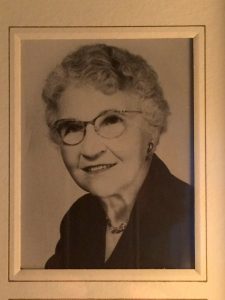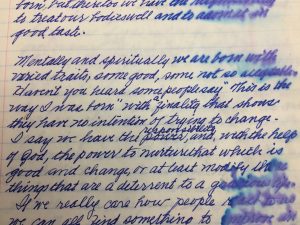Courage, humility, and old age

In May, with spring in swing, we are looking at stages of growth. Nancy Nordenson began our month with a beautiful essay about middle life and the blessedness of not knowing the future. Then, Anny Rusk and Christina Hoover Moorehead showed us the importance of children’s play. Last week we looked at the Hero’s Journey, and now we have come to Old Age.

Photo by FIrdaus Ansari on Unsplash
Bette Davis once said, “Old age ain’t no place for sissies.” But couldn’t you image a wizened Inuk after the seal hunt or gnarled San kinsman sipping precious water from a hollowed out ostrich egg telling the young ones this nugget of wisdom many centuries ago? Twentieth century folks certainly didn’t invent sagacity, but Bette said it so well, probably with a cigarette and a smirk.
Some people fear old age, but I was never one of them. I wanted to be thirty! Scratching and clawing up the cliffs of childhood and the teen years, I was sure that at thirty were all the smart answers, confidence, and maturity each of us wanted. Thirty came and went. I plodded on, unenlightened.
Doesn’t everyone say that at fifty-five we suddenly shrug off the Mantel of Turbulence with its worry about what others think and its fear of our own failings? It didn’t happen for me.
So, I’ve reached seventy years with only one wise plum: we don’t get to be perfect. We get to be a lot of things, but not perfect. I’m growing used to slogging through my days, looking for things that go right and celebrating them. Hurray, I didn’t burn the stew, nobody complained about the mistakes I made playing the hymns in church, and my upside-down strawberry planter is producing blooms, even though tiny sparrows have decided to lay their eggs in it!
There was another, strong reason that I didn’t fear old age. Growing up in Bluffton, Ohio, we were around so many older people. Families included the elderly—churches gladly used their skills, they showed up at our games and concerts, and then in true old age, they received the help of the Mennonite Memorial Home.

Photo by Claudia van Zyl on Unsplash
Grandma Martha (Baumgartner) Habegger went to The Home so that Mom and Dad could go to Botswana, Africa, to serve. It was a selfless gift for a greater good. Later, no one doubted that Grandma told God when she was going to die—during a trip my mother was able to make from Africa to Bluffton. We adult children came and sang our four-part harmonies to Grandma around her hospital bed, even though we didn’t know if she could hear us. Families do follow rituals in those times.
Grandma—a member of the first class of Bluffton College, in the early 1900s, when few women were encouraged to attend higher education—was tough and funny. She gave Swiss talks (in Berne, Indiana, and Bluffton) that were filled with humor, at least that’s what I learned from others. An immigrant’s grandchild, I couldn’t speak a word of our native tongue. I simply respected her get-up-and-go and tried never to be what she least admired, a ‘two by four.’ This reproach was reserved for folks who absolutely refused to entertain new ideas.
We all have known these tough, courageous old folks. They were/are our grandparents. Please enjoy Grandma’s letter to The Mennonite, titled Not afraid to be old. She also published a whimsical poem, A Geriatric Decision, about going to The Home, and recently I found an essay, Growing Old with Grace, in that gorgeous handwriting people used to exhibit. (See below.) It’s water stained, so I’m treating it with care.
______________________________
THE MENNONITE, 20 JANUARY 1981
Not afraid to be old
‘A letter (18 November 1980 issue) reflected the offense some people take at the sign “Home for the Aged.” I am always astonished at the way people cringe at words ‘old’ or ‘aged.’
Throughout life we should get used to them, for we say that the child is two years old or two years of age. If God then extends our life, we finally reach old age.
So what?
One can dye one’s hair or get a facelift, with which I have no quarrel, but one is still as old as the years one has lived. Some comforting words are often spoken to assuage the discomfort one might feel in growing old, such as “You are only as old as you feel.” But no, when I look in the mirror I see an old woman of 88.
So long as God gives us strength of mind and body we should never doubt that there is some purpose in our life. This calls for continual growth intellectually and spiritually with an ever deeper commitment to God’ guidance. It is healthy to retain a sense of humor and to be able to laugh at ourselves. To be interesting to other people, it is imperative to be a good listener.
A lady once asked Henry Drummond how he grew old so graciously. He answered, “Madam, I work at it daily.”
By no means am I a paragon of virtue in my effort to accomplish the above. Old age has its problems, but so does every age. A positive attitude makes one more content.
A church can do much in this area, and I feel that our church here does just that. [First Mennonite Church of Bluffton.] Many projects are put forth to span the generation gap. It is a common thing for young folks of all ages to notice us as living people and to say “Hi!” as they pass us. And they often say it first.’
Martha Habegger, Mennonite Memorial Home, Bluffton, Ohio
__________

Martha (Baumgartner) Habegger

In this paragraph of her handwritten essay, Growing Old with Grace, Grandma says:
‘Mentally and spiritually we are born with varied traits, some good, some not so acceptable. Haven’t you heard some people say, “This is the way I was born,” with a finality that shows they have no intention of trying to change. I say we have the responsibility, and, with the help of God, the power to nurture that which is good and change or at least modify these things that are a deterrent to a gracious life.’
__________
Thanks, Grandma Hobby. I miss you.
_____________________________________________________________________
I welcome your comments: gretaholtwriter.com/blog. Please enjoy a few short stories on the Home page, as well.
{Thank you to my niece, Addie Liechty, for taking the picture above that is this blog’s featured image. Her blog is: https://addieswriting.wordpress.com.}
Best wishes and have a good week.
Greta
Like your grandmother, I often wonder why people “cringe at the word ‘old'” and have so much difficulty accepting their advancing age. (My husband and I talk about this all the time. He’s one of those having quite a bit of difficulty with the aging concept!)
Thank you for sharing her beautiful writing–it certainly runs in the genes!!
You know, it’s interesting that we have to fight like crazy against premature aging–eating right and exercising and working against depression/fear–but there is such grace and peace in accepting what we must as true old age becomes a reality.
My brother sent me a quote today about how adaptive it is that our bodies wear out so we will be more prepared to die. I don’t know if your Grandma Hobby would agree with this but I suspect she would. There is a graciousness about acceptance that she understands.
What a treasure to have her letter. Thanks for sharing with us.
Oh, I like that quote. It puts our old bodies in perspective.
Thank you, Greta. Like you, as a child I couldn’t wait to be a grownup and I never looked back. Age has meant – and continues to mean – experience, having learned some lessons, looking forward to more to come. The “aged” have so much to share and teach us.
Yes, I’m so glad for the lessons I’ve learned. I can’t say that I welcome all the lessons that will have to be learned! My arms try to remain open. Thanks, Barbara.
Thank you for sharing your grandmother’s letter. My grandmother used to send me letters and poems written in a similar, beautiful script, and this was such a nice reminder of those treasures.
By the way, I’m turning 55 this year, and was really hoping this would be the year that I ceased to worry about what other people think. 🙂 Oh, well, maybe 56?!?
Oh, that handwriting. It’s precious. I think by 80, I won’t care about what other people think! Thanks for the comment, Ross.